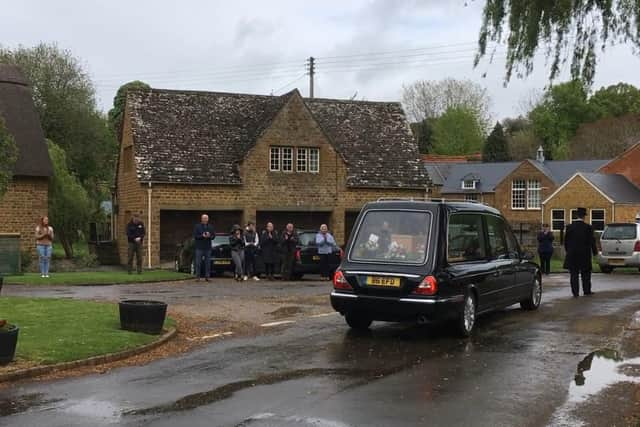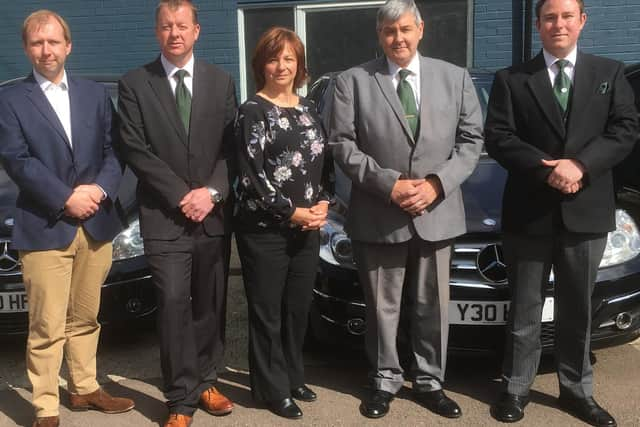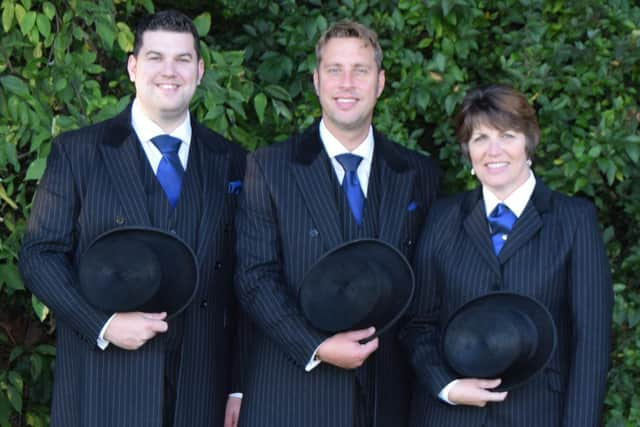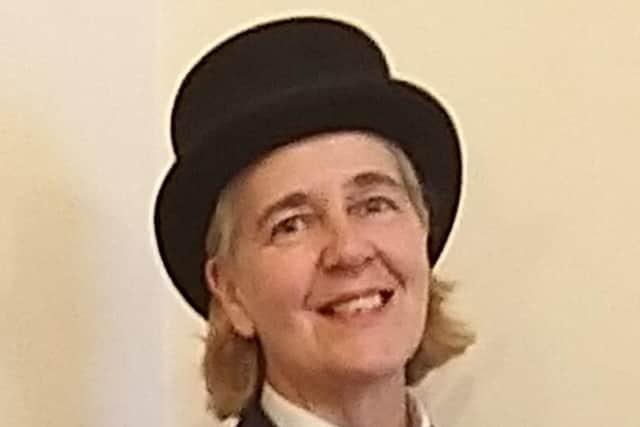'Heartbreaking' rule changes for funerals sees return of old custom in Banburyshire as residents turn out to line the streets to say farewell
and live on Freeview channel 276
Severe restrictions on numbers allowed at funerals have been made because of the risks of coronavirus.
In this special Banbury Guardian report funeral directors in our area describe how they are doing their best to continue to provide a meaningful family service to those grieving the loss of a loved one.
Advertisement
Hide AdAdvertisement
Hide AdThe far-reaching restrictions forced by the coronavirus pandemic is nowhere more starkly demonstrated than in our funeral services.


As couples and families are torn apart by death from the Covid-19 virus, they are no longer allowed the rituals that, for generations, have allowed humans and communities to bid farewell to loved ones and come to terms with their grievous loss.
But the awful restrictions on togetherness, human touch and comfort at such a life-changing moment, tinged with panic because of the risk of spread of coronavirus, are leading to some touching changes.
Communities, roads and villages are returning to an old custom of lining the streets to pay respects to those being taken to be laid to rest.
Advertisement
Hide AdAdvertisement
Hide AdEdd Frost, of Frost and Daughters Family Funeral Directors, said: “We are seeing communities returning to the tradition of lining the streets in their neighbourhoods.


“We have seen some quite moving events. In one village there were 100 or more residents lining the roads to see their neighour leave. People are social distancing but they are finding ways to pay their respects even though they can’t go to normal funerals.”
Another welcome innovation is the use of webcasting to live-stream a service from the Banbury Crematorium.
Matthew Humphris, of Humphris Funerals ,said: “We are able to utilise a webcast feature which allows those who cannot attend in person the opportunity to view the service live from home.
Advertisement
Hide AdAdvertisement
Hide Ad“This has been a real lifeline for people. We are also still regularly printing service sheets so that people may have a memento to pass on to those who could not attend.”


To preserve the safety of everyone, the Government has restricted the number of people attending to ten. For families who would have organised a large gathering this is very hard.
Mr Frost said: “Many families would have expected 200 or more visitors to their loves ones’ funerals and have really struggled with being allowed a maximum of ten. It was really difficult in the beginning but people realise now that things are different. We can’t offer limousines for families to travel together to the funeral.”
All funeral directors are missing the critical face-to-face contact with families. This has been replaced by telephone contact or Facetime and huge efforts are made to build up a rapport.
Advertisement
Hide AdAdvertisement
Hide AdEven in non-Covid-19 cases, viewings of the deceased in the chapel of rest can only happen once and for a maximum of two people.


Mr Humphris said staff wear full personal protective equipment (PPE) for movement of bodies and contact with family has to be minimal.
“It is certainly at odds with the empathetic conversation in which we would normally engage. We would also, under normal circumstances, strive for a more dignified appearance in order to give those present as much comfort and reassurance as we can.”
The process of certifying deaths has been streamlined dramatically, saving time and allowing registrations to be done from anywhere in the country.
Advertisement
Hide AdAdvertisement
Hide Ad“If somebody is confirmed to have died of a coronavirus related illness, we must have minimal contact with them and we are unfortunately unable to make the necessary preparations for families to visit the chapel of rest,” said Mr Humphris. “This is especially hard when families have been unable to visit their loved one due to lockdown of a care home or hospital ward.
“For those who are not suspected of having had contact with coronavirus we are able to make the necessary preparations for visits to the chapel but this must be strictly limited to close family, one visit per person and a maximum of two people visiting our offices at any one time.”
Coffins must be transported on wheels to the crematorium chapel or to the graveside. The attendants are the funeral director and one other staff member - there are no customary bearers, often family or friends.
Mr Frost said: “It is sometimes so distressing. I have seen a mother and her children spaced apart - they can’t touch or hug - there is no gathering. It is so hard for them. I have never known anything like it. It is heartbreaking. Many are planning services of thanksgiving and celebrations of life for after this crisis is over and of course we will help with those.
Advertisement
Hide AdAdvertisement
Hide Ad“The important thing is we funeral directors must work together to help each other and look after our communities. It is so hard when people want company. We all have to be aware of others’ mental health and we work closely with the Banbury Therapy Centre,” he said.
Mr Humphris said: “There has also been a spirit of co-operation between all of our local colleagues through regular communication helping us to respond to any sudden change in circumstances and avoid any further deviation from how we would like to be doing things and how the public would like them to be done.”
Remembering from Afar
Co-op Funeralcare in Middleton Road aims to provide funerals that are unique and special in spite of the restrictions of social distancing. This company also offers live-streaming or recording of services.
“We are happy to arrange for the person taking a funeral service to pause at a certain time, which can be communicated in advance to those who can’t be in attendance - helping to unite all family and friends in a moment of quiet reflection and celebration of the person who has passed,” said funeral director Dawn Stokes.
Advertisement
Hide AdAdvertisement
Hide Ad“We will also provide seeds such as forget-me-nots, daisies and sunflowers for the recipients to plant in their gardens in memory of the deceased.”
“Currently, places of worship have been temporarily closed for public gatherings, meaning no churches can host services of any kind, including funeral services. Those attending funerals are encouraged to continue following government advice ensuring they wash their hands regularly and leave at least two metres between them other mourners who may be from a different household.
“At Co-op Funeralcare, we have developed our own virtual service, ‘Remembering From Afar’, which enables mourners to watch their loved one’s funeral service from the safety of their home. We can also arrange for a traditional black hearse to be used and for it to take a specific route on the way to the service destination, to give more family, friends and neighbours the chance to pay their respect as it passes in these difficult circumstances.
“We understand this can be very challenging when families are close, and they are seeking comfort at what is already a very difficult, sensitive time,” she said. “All colleagues have received specific training which is relevant to the funeral sector during the Covid-19 crisis.”
Huge efforts are being made
Advertisement
Hide AdAdvertisement
Hide AdFuneral directors are trying to carry out funerals in a way as close to normality as possible, still using normal vehicles, said Matthew Humphris.
“Currently we are not wearing any personal protective equipment (PPE) when conducting funerals as all of our equipment, including the coffin, is
thoroughly disinfected before leaving our premises,” he said.
“The vehicles are equipped with hand sanitiser and all operatives will keep a safe distance from the public while attending on the funeral. It must be said that all families we have come into contact with have been incredibly understanding regarding the current situation and we must thank them for this and their continuing patience.
Advertisement
Hide AdAdvertisement
Hide Ad“Our local burial and cremation authorities have also been - not only working tirelessly but also taking a sensible approach to restrictions avoiding some draconian measures we have seen in other parts of the country.
“Ministers and celebrants continue to strive hard to offer the best support possible to those in need under difficult circumstances. Regarding PPE throughout the pandemic, while we have seen some delays and short-term shortages I think as an industry we were always in a better position than those in certain healthcare settings because it is part of our normal equipment
so we always have a stock and regular supply chains.
“Our only problems came with certain items of which we were suddenly using more than usual such as the full protective suits. “We have, however, found alternatives to these which we have been able to utilise in less hazardous scenarios,” Mr Humphris added.
Private ambulances are used as funeral vehicles to return bodies from the Horton, the John Radcliffe Hospital, care homes or homes.